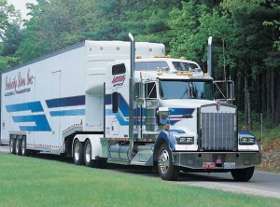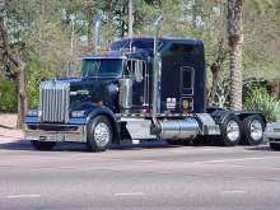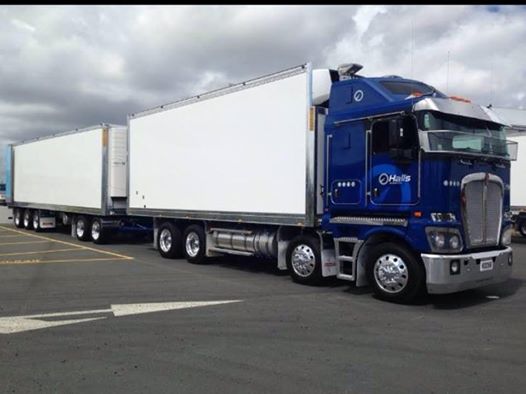Boneheaded Move
Topic 4299 | Page 1

Take a deep breath get back on the horse and you won't do it again ,without using g.o.a.l..

I got out twice when backing in lol. I was pulling out onto the road . That's what kills me about it
TWIC:
Transportation Worker Identification Credential
Truck drivers who regularly pick up from or deliver to the shipping ports will often be required to carry a TWIC card.
Your TWIC is a tamper-resistant biometric card which acts as both your identification in secure areas, as well as an indicator of you having passed the necessary security clearance. TWIC cards are valid for five years. The issuance of TWIC cards is overseen by the Transportation Security Administration and the Department of Homeland Security.
Chris, everyone of us here understand your feelings and embarrassment. This job has a sometimes not so subtle way of making us realize our shortcomings. Just at the moment when you are feeling good about things it will slam you to the ground and make you feel like a "bonehead". It takes constant vigilance even when you are moving slowly in an area that seems to be free of obstructions.
I once had a car start spinning in circles out of control and cross right in front of me at highway speed. It was nothing short of a miracle that we didn't collide. Things happen, most of them we can avoid, but even when we mess up the best medicine is to do just what Cory said - take a deep breath and go at it some more. You're gonna be fine, but this most likely will go on your company record. Let it be a reminder of how much you have to be on top of your game when you are behind the wheel.
Hang in there! 

Thanks OS and I'm definitely not gonna let this get me down. I know I made a mistake and that's all it was. That ended up having to replace 1 rim and they put my spare on it. Now I'm wondering am I gonna have to pay for the rim and the service since it was a preventable accident on my part?

Thanks OS and I'm definitely not gonna let this get me down. I know I made a mistake and that's all it was. That ended up having to replace 1 rim and they put my spare on it. Now I'm wondering am I gonna have to pay for the rim and the service since it was a preventable accident on my part?
Preventable accident means it was your fault the damage happened so I guess they are going to make you pay for it instead of doing an insurance claim.

Never been charged for anything like that. Just depends on your company I guess. I blew the bead on a covered wagon once turning to sharp. It's a lot easier to blow one with the split tandems especially on a hot day. Company took care of that one for me. But it was small company ran by some "good ole boys".
Good luck maybe they'll cut you a break.
I'm Sober-J over
Tandems:
Tandem Axles
A set of axles spaced close together, legally defined as more than 40 and less than 96 inches apart by the USDOT. Drivers tend to refer to the tandem axles on their trailer as just "tandems". You might hear a driver say, "I'm 400 pounds overweight on my tandems", referring to his trailer tandems, not his tractor tandems. Tractor tandems are generally just referred to as "drives" which is short for "drive axles".
Tandem:
Tandem Axles
A set of axles spaced close together, legally defined as more than 40 and less than 96 inches apart by the USDOT. Drivers tend to refer to the tandem axles on their trailer as just "tandems". You might hear a driver say, "I'm 400 pounds overweight on my tandems", referring to his trailer tandems, not his tractor tandems. Tractor tandems are generally just referred to as "drives" which is short for "drive axles".
Covered Wagon:
A flatbed with specially fitted side plates and curved ribs supporting a tarp covering, commonly referred to as a "side kit". Named for the resemblance to horse-drawn covered wagons.
Thanks OS and I'm definitely not gonna let this get me down. I know I made a mistake and that's all it was. That ended up having to replace 1 rim and they put my spare on it. Now I'm wondering am I gonna have to pay for the rim and the service since it was a preventable accident on my part?
Preventable accident means it was your fault the damage happened so I guess they are going to make you pay for it instead of doing an insurance claim.
No, I think this is incorrect. Will it be on your DAC? I'd say yes. But I do not believe you'll be charged for it, assuming you're a company driver. Companies carry insurance (even if they're self-insured) and budget for these types of mishaps as part of the cost of doing business. It would be unreasonable for a company to charge a driver for every little thing that goes wrong out there.
DAC:
Drive-A-Check Report
A truck drivers DAC report will contain detailed information about their job history of the last 10 years as a CDL driver (as required by the DOT).
It may also contain your criminal history, drug test results, DOT infractions and accident history. The program is strictly voluntary from a company standpoint, but most of the medium-to-large carriers will participate.
Most trucking companies use DAC reports as part of their hiring and background check process. It is extremely important that drivers verify that the information contained in it is correct, and have it fixed if it's not.

But if you were Leasing, you would have to pay out of pocket... the smart leasers have a maintenance reserve, which acts like the companies self-insuring scheme... It's just a matter of who pays what in the end.
There is never a moment when that truck is moving that you don't have to be vigilant. In fact, I've mentioned before that most of the worst wrecks I've ever witnessed happened on a sunny day, dry roads, and light traffic. Ideal driving conditions. That's when people tend to let their guard down and make a mistake. That's obviously what happened here. You got past the difficult part and let your guard down for a minute when you got to the easier part. That's human. Unfortunately you can't be "too human" in trucking.
We've all made our share of mistakes and nobody has a long, successful, and safe career without quite a bit of good luck and the grace of God. But nobody has a career like that without a tremendous amount of focus, a sharp awareness, tons of patience, and smart decision making. You were given a tap on the shoulder by the trucking Gods and they mercifully showed you in a small way how quickly things can go catastrophically wrong. Consider that a tremendous blessing and take it to heart - which I know you will.
Today you'll be the most attentive driver on the road. Probably tomorrow too. The trick is to maintain that attentiveness every second you're behind that wheel regardless of circumstances.

New Reply:
New! Check out our help videos for a better understanding of our forum features

















Preview:








 TT On Facebook
TT On Facebook
So all throughout school I never so much as rubbed a cone. Perfect scores across all of my backing tests. Now here at the consignee on my third load, it is a pretty small place in port Allen Louisiana right on an industrial road. I had to blindside back off of the road, through the curbs and shrubbery and into my dock. I nailed it. I was pumped............ Then pulling out of the lot I hit a curb and damage both outer rims on my trailer tandems and knock both tires off the bead!! Talk about humbling. I'm definitely seeing how this job can start pumping your chest up and then immediately slam you to the ground in the next second. I guess as far as incidents go I can't ask for a much simpler one. No damage to the property of the consignee which was a huge sigh of relief for me. Just thought I'd share my experience on here
Consignee:
The customer the freight is being delivered to. Also referred to as "the receiver". The shipper is the customer that is shipping the goods, the consignee is the customer receiving the goods.
Tandems:
Tandem Axles
A set of axles spaced close together, legally defined as more than 40 and less than 96 inches apart by the USDOT. Drivers tend to refer to the tandem axles on their trailer as just "tandems". You might hear a driver say, "I'm 400 pounds overweight on my tandems", referring to his trailer tandems, not his tractor tandems. Tractor tandems are generally just referred to as "drives" which is short for "drive axles".
Tandem:
Tandem Axles
A set of axles spaced close together, legally defined as more than 40 and less than 96 inches apart by the USDOT. Drivers tend to refer to the tandem axles on their trailer as just "tandems". You might hear a driver say, "I'm 400 pounds overweight on my tandems", referring to his trailer tandems, not his tractor tandems. Tractor tandems are generally just referred to as "drives" which is short for "drive axles".